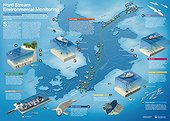Nord Stream Presents Results of Environmental Monitoring at Baltic Sea Day
- Findings show that environmental impacts of pipeline construction are minor, local and short-term only
- Environmental monitoring and survey data available online for further scientific research in Data and Information Fund
March 20, 2015 | St. Petersburg | Today, Nord Stream AG presented the results and learnings of the environmental monitoring of the Nord Stream Pipeline at the Baltic Sea Days in St. Petersburg. The findings show that the construction of the two 1,224 km offshore pipelines through the Baltic Sea had only minor and short-term impacts on the environment.
From planning to completion of the project, Nord Stream invested over 100 million euros into environmental studies, planning and route design. More than 40 million euros of the overall investment were devoted exclusively to the environmental monitoring system. During construction, 22 renowned companies were contracted to analyse 16 scientific subjects at about 1,000 sampling locations along the route from 2010 to 2012. The geophysical surveys covered roughly 40,000 line kilometres. After construction, data associated with the reinstatement and recovery of the Baltic Sea were also recorded and analysed.
The results prove: Nord Stream’s responsibility for the environment and its objectives – to minimize the pipeline length, to avoid environmentally sensitive areas, and to keep restrictions on marine users to a minimum – were successfully met. The findings of the analyses of the data show no unexpected environmental effects. All measured impacts were minor, locally confined and short-term only.
In order to continue this path and foster further scientific exploration, Nord Stream has made the data from its environmental monitoring and surveys available for researchers and others working on preserving and improving the Baltic Sea. One year ago, all collected data was published on Nord Stream’s website in form of the Data and Information Fund – Nord Stream’s contribution to the HELCOM Baltic Sea Action Plan. The searchable data catalogue offers scientists access to comprehensive information on marine live and cultural heritage.
The use of the Data and Information Fund (DIF) online portal is available for academic, research, educational, and governmental purposes.
The latest Environmental and Socio-economic Monitoring Report (published in 2014) is available for download here.





